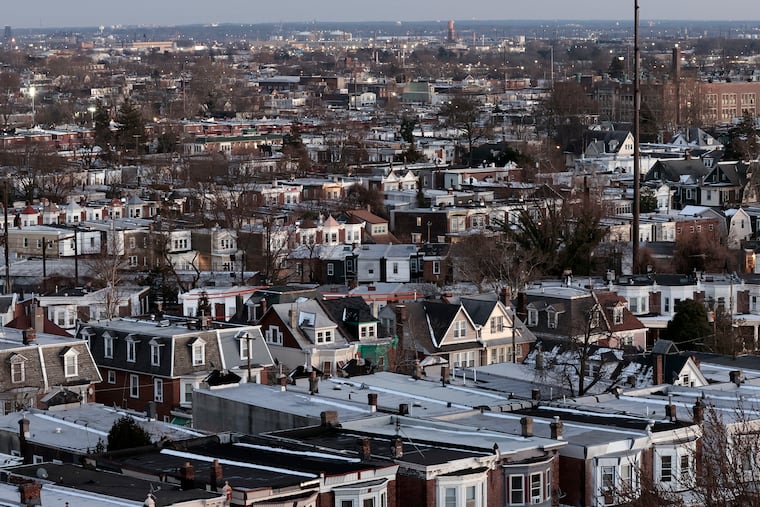Philly-area homeowners are staying in their homes longer than most
Nationwide, the typical homeowner has lived in their home for roughly 12 years, almost twice as long as in 2005. Generational differences and mortgage interest rates help explain why.

Homeowners in the Philadelphia area are staying in their homes longer than owners in other cities and the country as a whole.
Of the most populous U.S. metropolitan areas, the Philly metro is one of seven where a typical homeowner stays in their home more than 16 years, according to an analysis by the online real estate brokerage Redfin. In 2023, the median length of time homeowners in the region have lived in their homes was 16 years and a little over a month. That’s up a bit from 15 years and eight months in 2022.
Nationwide, the typical homeowner has lived in their home for roughly 12 years. That’s down from a peak of almost 13½ years in 2020. But it’s almost twice as long as in 2005, mainly driven by more older Americans staying in their homes as they age instead of downsizing or moving into assisted-living facilities, according to Redfin.
» READ MORE: Philly is one of the worst big cities for aging in place. Local experts aren’t surprised.
“We used to have a lot more sellers, just like every other broker,” said Matin Haghkar, broker/owner of RE/MAX Plus, which operates in Philadelphia and its collar counties in Pennsylvania. But in the last year or two, more of his clients have been buyers.
In recent years, homeowners have been moving less because of market conditions. Mortgage interest rates are up after dropping to historic lows early in the pandemic. Homeowners who bought or refinanced when rates were low are reluctant to sell and pay a higher rate for another home loan.
And owners also have spent years hearing that there aren’t enough homes available for sale. “That’s really been scaring a lot of people away from selling their homes as well,” Haghkar said. And it’s contributing to a chicken-and-the-egg situation that is helping to suppress housing supply.
Buying a home is often an emotional decision, and people get attached to their homes, which makes selling difficult. An increase in government and mortgage lender programs offering homeowner assistance also has helped more people stay in their homes, Haghkar said.
Heading into the typically busy spring housing market, more homeowners are now starting to sell, and home supply is increasing a bit, he said, but “it’s still not enough for the demand. We still need, I think, double of what’s out there.”
It’s a generational thing
How long someone stays in their home often depends on which generation they belong to. The U.S. population is aging, and baby boomers and Generation X are most likely to own homes, which means they are driving trends in homeowner tenure. More than half of baby boomer homeowners don’t have a mortgage, so staying put can make financial sense for them.
Two in five baby boomers have lived in the home they own for at least 20 years, and 16% have lived in their homes for 10 to 19 years, according to Redfin. More than 1 million of the more than 6 million people who live in the Philadelphia metro area are 65 or older, according to the Census Bureau. More than a third of Generation X homeowners have lived in their homes for at least 10 years.
» READ MORE: What aging homeowners should consider when navigating their next move and decades of memories
Younger generations stay in their homes for shorter periods, mainly because they have been adults for less time, and they buy starter homes that are generally more affordable that they grow out of. They also tend to job hop more than older generations did.
Thirty percent of millennial homeowners have lived in their homes for less than five years, and 13% have lived for five to nine years in their homes.
“You buy your first home, and then you buy your second home, which is the home you stay in a long time generally,” said Philadelphia-area agent Maria Quattrone, founder and chief executive officer of Maria Quattrone & Associates and owner of RE/MAX @ HOME.
» READ MORE: Philly-area buyers need to make thousands of dollars more than last year to afford a starter home
A lot of moves are driven more by life decisions than larger market trends. Quattrone said some clients just moved to Charleston, S.C., for a change of scenery after living in their Southwest Center City home for eight years. Other clients sold their Bucks County home in early February after four years because of a job move. Clients are selling their home in Montgomery County after only 15 months because they miss their support system back in Texas.
And some older Philly-area homeowners are moving because they need to for financial or health reasons, or because they want to. They may downsize and retire in places such as Florida, Arizona, or the Jersey Shore, or they’ll buy a home that is the same size or bigger as a place for family to gather, Quattrone said.